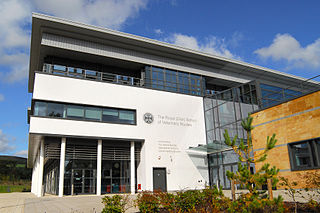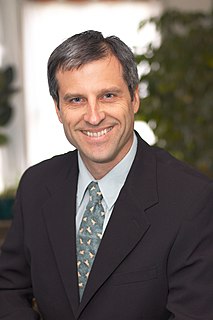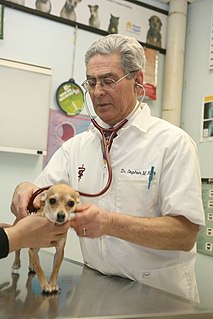Nedim C. Buyukmihci is an American doctor of veterinary medicine, specializing in veterinary ophthalmology, and founder of the Association of Veterinarians for Animal Rights. [1] A leading figure within the animal rights movement, [2] [3] he is an outspoken critic of scientific testing on animals. [3] [4] He is a professor emeritus of ophthalmology at the University of California, Davis' School of Veterinary Medicine, [5] [6] having retired in 2003.
Buyukmihci founded the Association of Veterinarians for Animal Rights in 1981 with fellow veterinarian physician Neil Wolff. [7]
Buyukmihci joined the staff of the University of California, Davis in 1979, almost immediately conflicting with the School of Veterinary Medicine administration with his opposition to the use of shelter animals as test subjects for surgery practice. [8] He retired from the university in the spring of 2003, retaining his emeritus professorship. [2] In August 2003, he took up a position as director of the Animal Protection Institute's primate sanctuary for non-human primates in Dilley, Texas. [3] [9] He is a diplomate of the American College of Veterinary Ophthalmologists. [10]
His sister Nermin founded America's first cruelty-free vegan store, Nermin's Dry Goods, in the late 1970s. [11]
They were the two children of Hope Sawyer Buyukmihci of the Unexpected Wildlife Refuge, which was frequently featured in Ahimsa, a publication of the American Vegan Society.

Veterinary medicine is the branch of medicine that deals with the prevention, management, diagnosis, and treatment of disease, disorder, and injury in animals. Along with this, it deals with animal rearing, husbandry, breeding, research on nutrition, and product development. The scope of veterinary medicine is wide, covering all animal species, both domesticated and wild, with a wide range of conditions that can affect different species.

A veterinarian (vet), also known as a veterinary surgeon or veterinary physician, is a medical professional who practices veterinary medicine. They manage a wide range of health conditions and injuries in non-human animals. Along with this, vets also play a role in animal reproduction, animal health management, conservation, husbandry and breeding and preventive medicine like animal nutrition, vaccination and parasitic control as well as biosecurity and zoonotic disease surveillance and prevention.

The American Veterinary Medical Association (AVMA), founded in 1863, is a not-for-profit association representing more than 99,500 veterinarians in the US.

The Cleveland Metroparks Zoo aka Cleveland Zoological Park is a 183-acre (74 ha) zoo in Cleveland, Ohio. The Zoo is divided into several areas: Australian Adventure; African Savanna; Northern Wilderness Trek, The Primate, Cat & Aquatics Building, Waterfowl Lake, The RainForest, and the newly added Asian Highlands. Cleveland Metroparks Zoo has one of the largest collections of primates in North America, The Zoo is a part of the Cleveland Metroparks system.
The Virginia–Maryland College of Veterinary Medicine is a state-supported college of two states, Virginia and Maryland, filling the need for veterinary medicine education in both states. Students from both states are considered "in-state" students for admissions purposes.
A veterinary specialist is a veterinarian who specializes in a clinical field of veterinary medicine.

In 1985, a raid took place at a laboratory belonging to the University of California, Riverside (UCR) that resulted in the removal of a monkey by the Animal Liberation Front (ALF). This monkey, called Britches, was a stump-tailed macaque who was born into a breeding colony at UCR. He was removed from his mother at birth, had his eyelids sewn shut, and had an electronic sonar device attached to his head—a Trisensor Aid, an experimental version of a blind travel aid, the Sonicguide—as part of a three-year sensory-deprivation study involving 24 infant monkeys. The experiments were designed to study the behavioral and neural development of monkeys reared with a sensory substitution device.

Veterinary education is the tertiary education of veterinarians. To become a veterinarian, one must first complete a veterinary degree in Doctor of Veterinary Medicine.

The Royal (Dick) School of Veterinary Studies, commonly referred to as the Dick Vet, is the veterinary school of the University of Edinburgh in Scotland and part of the College of Medicine and Veterinary Medicine the head of which is Moira Whyte. David Argyle has been Dean and Head of School since 1 November 2011.

Gene Baur, formerly known as Gene Bauston, is an author and activist in the animal rights and food movement. He’s been called the "conscience of the food movement" by Time magazine, and opposes factory farming and advocates for what he believes would be a more just and respectful food system. Baur is president and co-founder of Farm Sanctuary, a farm animal protection organization. He is vegan and has been involved with animal rights since he co-founded Farm Sanctuary in 1986. Baur has authored two books and various articles.
The Student American Veterinary Medical Association (SAVMA) is a national association of student chapters of the American Veterinary Medical Association (AVMA) at schools and colleges of veterinary medicine in the United States, Canada and the Caribbean. SAVMA acts as a single national voice for veterinary students in accordance with the policies and goals of the AVMA, coordinates AVMA student chapter activities, facilitates the exchange of information, and represents the interests of student veterinarians within AVMA, the veterinary profession and in the political and legislative arenas nationally.
Dr. Martin R. Dinnes was a veterinarian from Agua Dulce, California, recognized for his accomplishments in veterinary medicine. He died on December 12, 2017.

In Defense of Animals (IDA) is an animal protection organization founded in 1983 in San Rafael, California, US. The group's slogan is "working to protect the rights, welfare, and habitats of animals".
Alternative veterinary medicine is the use of alternative medicine in the treatment of animals. Types alternative therapies used for veterinary treatments may include, but are not limited to, acupuncture, herbal medicine, homeopathy, ethnomedicine and chiropractic. The term includes many treatments that don't have enough evidence to support them being a standard method within many veterinary practices.
Women have played a central role in animal advocacy since the 19th century. The animal advocacy movement – embracing animal rights, animal welfare, and anti-vivisectionism – has been disproportionately initiated and led by women, particularly in the United Kingdom. Women are more likely to support animal rights than men. A 1996 study of adolescents by Linda Pifer suggested that factors that may partially explain this discrepancy include attitudes towards feminism and science, scientific literacy, and the presence of a greater emphasis on "nurturance or compassion" amongst women. Although vegetarianism does not necessarily imply animal advocacy, a 1992 market research study conducted by the Yankelovich research organization concluded that "of the 12.4 million people [in the US] who call themselves vegetarian, 68% are female, while only 32% are male".

Veterinary medicine in the United States is the performance of veterinary medicine in the United States, normally performed by licensed professionals, and subject to provisions of statute law which vary by state. Veterinary medicine is normally led by veterinary physicians, termed veterinarians or vets.
Animal welfare and rights in Ethiopia is about the treatment of and laws concerning non-human animals in Ethiopia. Ethiopia has highly limited animal welfare regulations by international standards, and appears to have little animal activism.
Animal welfare and rights in Switzerland is about the treatment of and laws concerning non-human animals in Switzerland. Switzerland has high levels of animal welfare protection by international standards.
Kay Mehren is an American-Canadian veterinarian, who is the former senior veterinarian of the Toronto Zoo. She can be seen in the television series Zoo Diaries.









